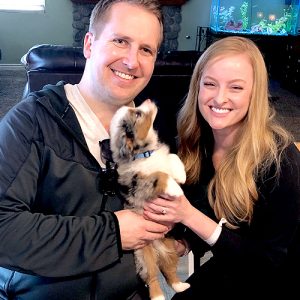 On the evening of February 14, Valentine's Day, 2017, Brent Freeman was heading home on his motorcycle on the 405 freeway in Los Angeles when he was struck by a car, ejected from his bike, and sent flying headfirst into another vehicle. Brent was rushed to the UCLA Medical Center in critical condition. He sustained internal injuries, including a traumatic brain injury (TBI) and multiple skull fractures, causing brain bleeding and swelling. And he was placed into a medically induced coma for several weeks to help protect his brain from further damage.
On the evening of February 14, Valentine's Day, 2017, Brent Freeman was heading home on his motorcycle on the 405 freeway in Los Angeles when he was struck by a car, ejected from his bike, and sent flying headfirst into another vehicle. Brent was rushed to the UCLA Medical Center in critical condition. He sustained internal injuries, including a traumatic brain injury (TBI) and multiple skull fractures, causing brain bleeding and swelling. And he was placed into a medically induced coma for several weeks to help protect his brain from further damage.
Doctors confirmed that the injuries to Brent's brain led to severe vision loss, including total blindness in his left eye and a loss of vision in half the visual field of his right eye. Brent also lost his sense of smell and had a reduced ability to taste. His physical deficits included adhesive capsulitis, which limits the movement of the shoulders, and a torn Iliotibial (IT) band, the tissue that runs along the hip to knee, in his left leg.
Brent was transferred to Long Beach Memorial Medical Center before being admitted to the Residential Inpatient program at CNS Los Angeles. Brent remembers how he felt when he began his brain injury rehabilitation. "I was in denial, I was super aggressive, and I didn't think I needed to be there," he said. But after transferring to CNS' Day Treatment program, he continued rehabilitation, attending therapy six hours a day, four days a week, being transported between his home and the clinic by our certified Transportation Services Department.
Each day, Brent received a wide range of integrated therapies, including physical, occupational, speech, vision, and education therapy, as well as counseling and case management services.
"We had to modify every discipline to accommodate my impaired vision," said Brent. "But everyone was more than willing to adapt their curriculum to work with me, and I know that is a big part of why CNS helps people. All my therapists showed me different ways to adapt to my new normal and inspired me," he said.
Brent remembered occupational therapy as being particularly valuable in helping him regain vital life skills necessary for independence. "My occupational therapist, Gina, was incredible," Brent said. "She taught me different exercises and ways to work with my limited vision," he said. "For example, she showed me some adaptive cooking items to use in the kitchen. By the end, I was making tortilla wraps, hummus, and dicing vegetables using guards and different protectors, so my fingers weren't in danger," he said.
Therapists also helped Brent interface with the Braille Institute in Anaheim, an organization that offers training and services for the blind and visually impaired, and he began attending sessions each week to learn braille.
Brent said he first noticed his improvement in cognitive rehabilitation when he started to complete more challenging exercises in half the time. "I remember having that ah-ha moment realizing that things were getting better and feeling excited," he said.
After ten months of intensive brain injury rehabilitation, Brent was discharged in August of 2019. He is now married, and he and his wife have recently purchased a home and added an Australian Shepherd puppy to the family. He can now read all numbers, the alphabet, and punctuation in braille and has been working with a personal trainer to continue the mobility that he regained at CNS.
"There might be different challenges that pop up, but it's exciting to see that things are getting under control and I'm getting back to how great life was before the accident," he said.
"I've had to make some adaptations, but it's been easy to integrate them after incorporating them into my daily life at CNS,” Brent continued.
"I'm so grateful for the amazing things CNS was able to do for me and the fact that it was able to help open my eyes to see what the future can hold.”
CNS Monthly Newsletter
The latest CNS updates, including events, company information, and patient care developments
The Inside View
Quarterly magazine focused on brain injury research, rehabilitation, and advancements shaping the field
Sign-up for one or both to stay connected with brain injury news and recover